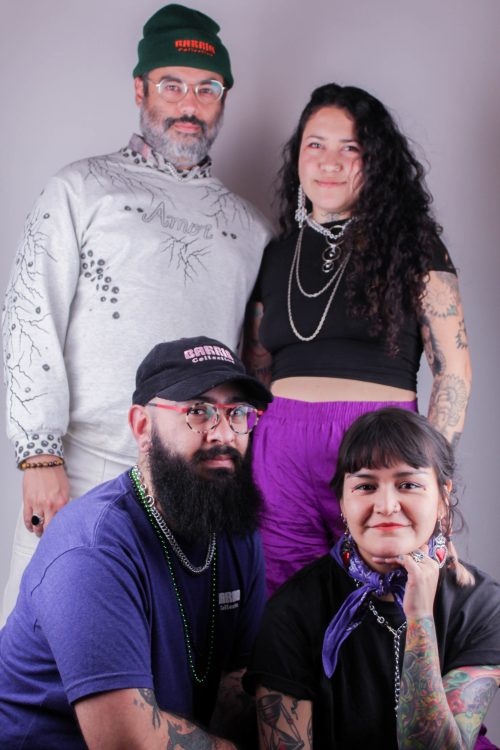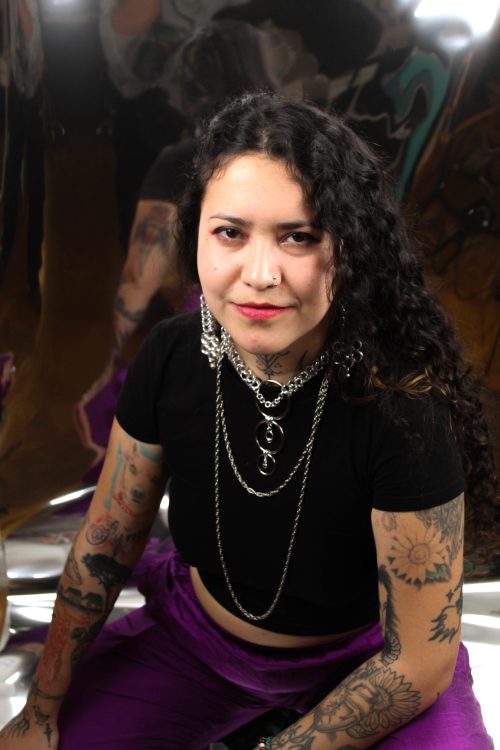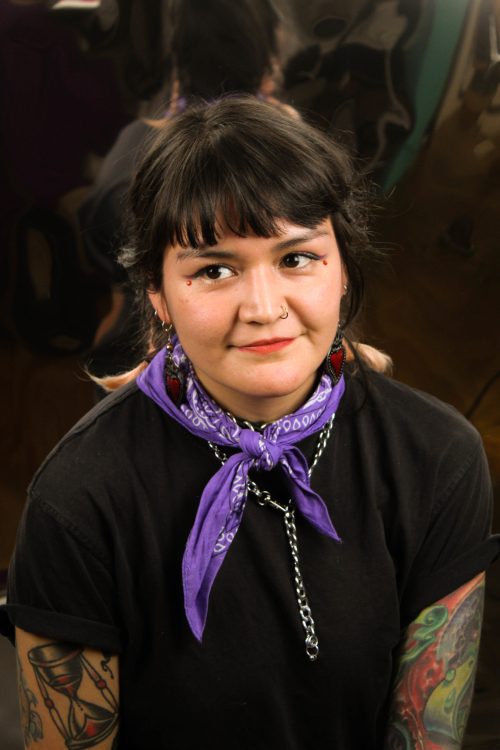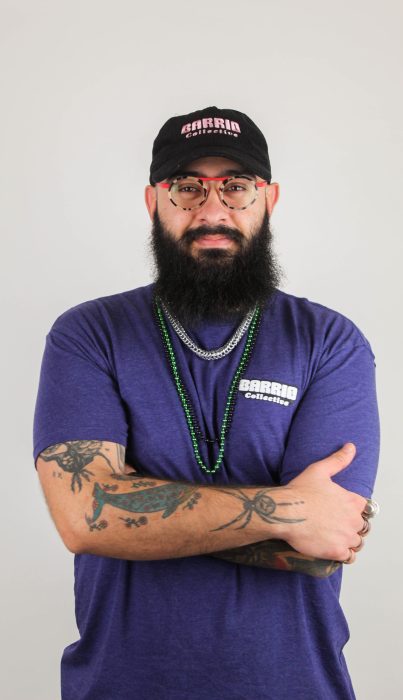Adrian Patiño from Barrio Collective: building community through music

Roxane Cassehgari
13 June 2022 | Music

Adrian Patiño is a multi-faceted powerhouse: a graphic designer, a DJ and as of more recently, he’s become an event producer. Along with his three co-conspirators, Loly Bonilla, Francia Valbuena and Chris Melendez, Adrian has created Barrio Collective, a Latinx-powered collective that organizes events all around Brooklyn: parties, vendors’ fair, art galleries, you name it. They do this for the community and to give spaces for young Latinx artists in New York to show their art and talent.
There is a whole journey that has led to what Barrio Collective is today. Six years ago, Adrian started DJ-ing and organizing parties that felt like a crossover between your old salsa parties and your regular Brooklyn cool kids’ parties. There, you could listen to salsa, boogaloo, but also Haitian kompa, electro, reggae, etc. Any diaspora kid who has grown up listening to a variety of music genres, felt seen. And this is what drove Adrian to music and event production: to create spaces where immigrants in New York from all walks of life could feel at home while being far from home.
While things have boomed and expanded with Barrio Collective, the vision remains the same. Whether it is through the artist-vendors’ fairs or the parties, Barrio Collective wants to create places of connection for Latinx people and beyond. Adrian speaks of the common feeling of nostalgia, the experience of being an immigrant in New York, and the music of the African & Caribbean diaspora that connects so many of these communities in New York. In fact, the idea of “Barrio” (Neighborhood) captures all of this. El Barrio is the community where you find a sense of belonging regardless of whether you come from originally. It is the daily reminder that you are part of a place, through the viejitos playing dominos, the music that gets blasted from windows or the sound systems around the corner. It is the familiarity, the déjà vu, the old memories that are so dear and important to those who are far away from home. It is something that diaspora people long for, and in the words of Adrian, it is this feeling of nostalgia that you can cure through music, party and food.
In this interview, we use the term “Latinx” to respect the preference of the interviewee. When Adrian speaks of Latinx, he is referring to the young people of Latin American descent who live in New York and the US.
I know that you're Colombian and that you live in New York, but tell me a bit more about your story. Do you identify as a person belonging to a diaspora?
I was born in Miami, but I grew up all my life in Cali, Colombia. After 13 years in Cali, I went to Miami and lived there for 10 years. I moved to New York in 2013. When I arrived in Miami, I realized that there was a large Colombian diaspora that came to Miami in the 2000s. For me “diaspora” is a movement of people from one place to another. I do feel part of that movement.
Why did you decide to come to New York?
New York is where my parents met and fell in love, so for me coming here is part of a life cycle. I have also always felt like an anthropologist in a certain way. I like exploring how different our cultures can be, and yet how similar they make us, and for me that’s what brought me to music. Music brings different cultures together. What I like the most is to play salsa, and that rhythm was born in New York when immigrants and locals got together and played music. Being from Cali, salsa is almost a religion, and New York was always a reference point. Also, it is impressive here. There can be so much diversity in one single block. Here where I live, I meet people from all over the Caribbean, from all over the West Indies, from Haiti, Guyana. I have access to all that culture in my own block.
Is that what drove you to becoming a DJ and organizing parties?
I arrived in New York with this image that I had built up in my mind through salsa. But there weren’t many places where you could dance salsa that I could identify with. There were many Latin American parties, but there wasn’t a space to listen to new and interesting music from different cultures – music you could dance to. I couldn’t find it. So, I thought “if it does not exist, it’s up to me to open up those spaces.” I also wanted to open spaces where people could connect to each other. I am part of a group of young artistic people, and we look for things that are different from the mainstream. We seek out other people who have an affinity for art.
I arrived in New York with this image that I had built up in my mind through salsa. But there weren’t many places where you could dance salsa that I could identify with. There were many Latin American parties, but there wasn’t a space to listen to new and interesting music from different cultures.
How did you start?
I like spaces that can create a sense of community. I really liked the Bunker (an apartment shared by friends that became well-known in Colombian circles). It offered a meeting space for people who had just arrived in the country. Many people went to the Bunker for their first party in New York. They could feel comfortable there because it was a space that always welcomed people from different places, and many of them were immigrants. We started doing parties at the Bunker, and we continued doing events in bars.
My first official party was at Lovers Rock in Brooklyn. My friend, Felipe Quiroz, had been invited to play there every Wednesday, and he invited guest DJs. I told Felipe about the idea of playing old and new tropical sounds. He liked it and, it became the “Tropical, Past and Future” party. What we did with those parties was not common. It was diasporic music. It was a space for us to expose that sound influenced by the African diaspora. We played the music that we felt was not heard enough in Brooklyn bars. For example, I had never heard Haitian kompa in my life. Felipe was the person who introduced me to it, and I thought, what is that? It reminded somehow of salsa. And, how come I lived in a neighborhood with so many Haitians, but I had never heard this sound before? So, I started playing it. And when Haitian people would come to the party and hear what I was playing, they would get excited and surprised. But for me, it is also a New York sound. It comes from a New York community. And we play New York sounds. There would not be places to listen to both kompa and salsa, if it weren’t for those DJ circles that bring these sounds together.
Can you describe what you mean by “tropical sound”?
Tropical sound can be represented by any place in the tropical area, with palm trees and the ocean. It is a place of connection. The music you hear there is based on the African drums that came to the Caribbean and the Americas. It is music made by the African diaspora in this part of the world. Take sound system culture in Jamaica and the pico (sound system) from Barranquilla, Colombia. It is all part of the same thing. Still today, there are music collectors that look for music from Africa, bring it back to Colombia and play it in the loudest sound systems. Tropical sound is also the music that you listen through these sound systems. Those sound systems represent a lot of things. It’s urban music. It is music from “barrio popular” (working class/middle class neighborhood). That’s where music is found, music with the real soul. The music that tells the experiences you go through as a person, a person that may be navigating different cultures.
You have also introduced the idea of “el barrio”. Can you talk about your latest and bigger project Barrio Collective?
Barrio Collective is a collective that organizes parties but also vendors’ fairs and other events. We are creating spaces through music. Through these events, we also want to offer a chance to our friends and others to exhibit their work as artists and sell it. It can take years as an artist to make it because you’re worried about making money. You lose a lot of potential and creative talent because of these hurdles. We wanted to support this community of artists. And the idea of barrio (neighborhood) is that community you build. Whether you’re from Yemen or Colombia, if you live in Bushwick, you are part of the neighborhood. The barrio is that place where we feel welcome. It is that place that is familiar, that has those nostalgic things like the music, the food and the smells that remind you of home, wherever that is. For example, when I am on my way to Bushwick, I can feel this energy of a neighborhood full of life in every corner. People playing dominos, the yelling, the music, the dancing. You find that everywhere in the world, you can find those four guys playing dominos anywhere in the world… or backgammon. The barrio is a spirit or a feeling, not just a spot. The idea behind Barrio Collective is also to showcase the sound you can hear in these New York neighborhoods.
What events have you been doing with Barrio Collective?
With Barrio collective, we have organized several events. In the summer of 2019, we did our first vendor’s fair, La Feria in Brooklyn. Finding space to organize events has been the biggest hurdle for us, as immigrants. You have to prove yourself to deserve the space. So, when we finally got a space, it was important to offer it to our friends, to our community. We did various ferias and parties in the summer of 2019, and we kept doing them until the beginning of 2020, and then in March, we stopped. In the summer of 2020, we did Salsa al Parque, our first event since the pandemic started. Loly, my partner, and I we live close to prospect park. There were stuff going on every weekend, every day in the park, performances… So, we saw it as an opportunity for us to do it too. That’s the spirit of Barrio Collective. It’s “do it yourself.” We have also done art galleries, and we organized Barrio Fest. It is like a bigger Feria with multiple bands and performers in a big stage. Our most established party right now is called Déjà Vu, a monthly-based party that we host with our friend, Lia Camille. That one party represents the music that I want to be listening to in New York when I go out. It is our first party on a Friday.
Since the interview, new events have popped up, La Clave, a monthly salsa party with only vinyl sets, and Disco Locas, a party led by women DJs. Check out Barrio Collective’s website for their calendar.
Who is behind Barrio Collective?
We are four people behind the collective. Loly and I and two others: Chris Melendez and Francia Valbuena. Francia is Loly’s friend. She welcomed her to the city and showed her the way around. Her nickname is la cucha (term of endearment for old people, including parents in Colombia). She’s sort of the person that welcomes people in New York and tells them what to do, all the tips that you want to know when you move here. There are people who have gone through the same things that you have. They have learned lessons through mistakes that they don’t want you to make, and that’s the spirit of Barrio Collective. It’s being that group that can welcome you and give you tips on how to move through this culture and society. You go online and find resources, but it is not the real stuff you need. There is so much stuff that happens de bajo de cuerda (undergound), you know.
And Chris, he is kind of our manager. His dad was a manager of huge events in Manhattan, so that’s his background. He knows what a successful event looks like because he’s seen that all his life with his dad. He’s super professional and tries to make everything run smoothly. And he’s just been like our anchor. He has immigrant parents, but he’s grown up in New York. And when you have an immigrant background, even if you’ve lived here all your life, somehow you still feel that you’re not from here, that your roots are strong, and you look for that. In our parties, we see a lot of people like that, looking for their roots and trying to connect with Latinx artists.

I also notice that you are not describing your events as Colombian or Latinx party. Is that right?
We wanted to create a party for New York immigrants, or however you want to put it. The main thing is to bring people together. That’s the main reason why I organize parties, to create that space where people can come together, drink a beer and chat, and where someone like you or me can speak Spanish the whole night and it’s ok. In New York, these spaces had to be created by people who were looking for them. But I want the party to be as welcoming and as diverse as it can be because it is New York, and that’s what it is about. You’re in New York looking for connections. You’ll find them with us too. We are trying to solve nostalgia and satisfy the need to reconnect with old memories through a diciembre party or a carnaval party. And the easiest way to do this is through music and food. That’s the shortcut to solving nostalgia.
For me, it is also important not to put a flag on a party because it is not just a Colombian cumbia or a salsa party. It is always going to be a mix of music. You can listen to salsa or cumbia, house, champeta and music from Africa. The music I play is from a person from Cali who lives in New York. I want to emphasize that. I don’t like to say “I’m the Cali or the salsa DJ.” The idea is that the music needs to be danceable and open to anyone. Also, I want to show that we are not only merengue, or that the Dominicans are not only bachata, but that there is more variety in our cultures. We have done shows where Felipe played electronic music mixing with bullerengue from Colombia. They asked me last time if I could play “Latin music” because I was playing house music and I said no. While in Paris, a friend was asked to play American music. What’s that? Latin American music is American. Similarly, a traditional Colombian person might not understand what we do with the parties. There are people who think that it is only cumbia and salsa. And no, we cover a large spectrum of music genres, sounds that look like us and that it is a lot of things.
For me, it is important not to put a flag on a party. You can listen to salsa or cumbia, house, champeta and music from Africa. The music I play is from a person from Cali who lives in New York.


Yes, and you want to get to a point where you don't have to “identify” the party. You don’t need to have a specific culture attached to the party. If it was four white Americans throwing a party, you would not say this is an American party, you would just say this is a party. Similarly, your party is a party, and it just happens that the people behind it are Latinx.
Yeah. That’s a struggle. These spaces (the music industry) need to define you to understand you and to know who can like you. But it is so hard to define things like this. We play our music and people react like “F…what type of music is this?” It is just hard to define it because we have been influenced by so many things, and it is about our experiences. Someone can be from the same country, can be from the same city, and listen to complete different music. Homogenizing Latin American culture is so wrong. It is hard to explain to someone the diversity that exists in our communities. And having to educate every time, that’s tiring and that’s why it’s good to have the Barrio Collective events because I don’t have to explain it to anyone. They get it already. I don’t need to talk about Pablo Escobar when I go to these events ever, EVER!
For example, for that party “Déjà Vu”, the flyer started as a tropical throwback fiesta, that was the initial thing. Now I don’t need that. It is just “Déjà Vu”. Someone said, “oh yes it’s going to be a reggaeton y perreo party.” I am like “ok I don’t need to put that on my flyer.” I am going to also play other things and other DJs are going to be playing some other things, I don’t want to be boxed into what Latinx culture is supposed to be because it is so many things.
Homogenizing Latin American culture is so wrong. It is hard to explain to someone the diversity that exists in our communities. And having to educate every time, that’s tiring and that’s why it’s good to have the Barrio Collective events because I don’t have to explain it to anyone.
And people that go to your parties appreciate that.
In fact, who mostly comes to your parties? Latinx, first generation Americans, immigrant, other people?
I really like to create a sense of nostalgia in my parties. You can see it in the music that I play. I want to create emotions by playing a song that has not been heard in twenty years.
It is interesting you talk about nostalgia. As immigrants, we often have this fear of losing our culture little by little, one generation after another. Do people thank you for creating that space where they can reconnect with their culture?
You mentioned being part of a young Latinx community. In New York, there are many young Latinx artists that are contributing to challenging perceptions around gender, race, or what is to be Latinx, in general. Do you feel that you are also part of this?
Opening space through a party for people who are not visible most of the time, that is political.
We have no explicit political intention. Obviously, we have opinions, but for me, the important thing is to create spaces for different people to meet and if they want to talk about politics, let them talk about it. However, when Trump became president, it really pushed me to create more events and spaces for our music to be heard, to be able to say that we are here, and that immigrants and their music have their place in this country. For me, this is a motivation. The more parties the better. I want our music to play all over Brooklyn and everywhere too. So, although we don’t say it specifically, we are creating spaces for young Latinx to exist, party and thrive. What we are creating is community.
We are creating spaces for young Latinx to exist, party and thrive. What we are creating is community.

Barrio Collective has been doing so much. You are four people doing everything. You DJ, you produce events, you design your own flyers. Can we just take a moment to realize how much work you’re doing with so few people?!
Yeah! We’re doing a lot. We have learned to do a lot of things on our own. People recognize that it takes a lot of effort to put these events together. We just do it because we can, and because we have the energy right now, and we don’t want to lose momentum. It’s hard to explain why we do it other than we just want to have that party that we think has the potential to serve our community.